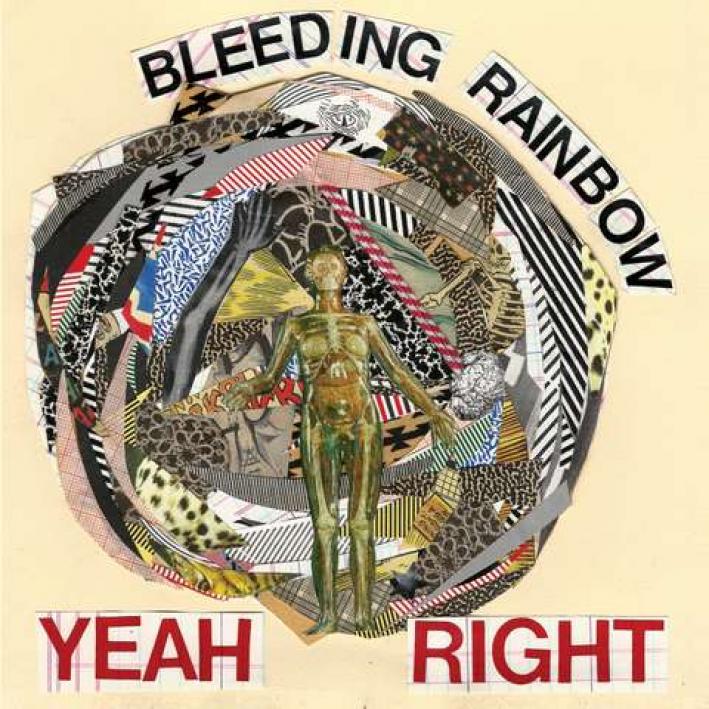When we talked with Bleeding Rainbow’s Rob Garcia earlier this month, he asserted that he and his bandmates don’t consider themselves revivalists. After all, you can usually spot pretty clearly the influences and reference points for most indie bands these days. So what if those reference points are more associated with the sounds of 80s and 90s indie rock than the next group crowding your average music blog?
I’d say that’s a fair point to make, and an important one to note when thinking about how we label music–if all of indie rock is borrowing and building on past ideas, is it fair to dismiss an artist as a “throwback” for using one we haven’t heard in a while? But while it’s a point that pretty successfully deflects accusations of being a nostalgia act, it does, in a way, make these artists “revivalists” in their own way. What else are you gonna call someone that attempts to breathe new life into a largely abandoned sound?
In the case of Bleeding Rainbow’s third LP, that’s the sound of big, noisy guitars and squelching feedback smack-dab in the middle of yer dreamy pop music. Yeah Right imagines a world where “shoegaze” is still a term much more synonymous with “noise pop” than “dream pop” and just as associated with dissonance as beauty. Lengthy stretches of droning feedback, interweaving riffs, and mountains of fuzz are punctuated with vocal hooks that disguise even the album’s most unconventional guitar orchestrations as dreamy pop. The resulting songs have a crushing, punishing quality that’s been absent from the music of their peers for too long.
None of this is to say that Yeah Right isn’t partially about dreamy pop songs. In fact, each of the record’s pre-release singles has exceeded its predecessor in terms of strung-out accessibility. So perhaps it’s appropriate that Yeah Right kicks off with Bleeding Rainbow’s most traditionally pretty moment yet. “Go Ahead” sounds straight up twee, Sarah Everton’s normally spacey vocals grounded in a melodic, girlish coo. It only takes two verses, though, for Bleeding Rainbow to launch themselves straight towards the stratosphere, and, once they get there, they stay there for the remainder of the album’s run time. The rest of Yeah Right’s pop moments are suspended in various states of atmospheric drugginess and amped-up riffage. “Drift Away” is couched in thick, enveloping fuzz, “Pink Ruff” is ethereal punk, “Waking Dream” floats contentedly above a cloud of smoke. Elsewhere, on tracks like “Shades of Eternal Night”, Everton’s vocals compete with instrumental flourishes that are as catchy as the choruses themselves, the songs becoming inseparable from the atmospheres that surround them.
Yeah Right’s dual interests in songwriting and guitar explorations end up being its greatest strength. While the elaborate instrumental orchestrations flesh out what might otherwise be somewhat nondescript shoegaze tunes, the best songs serve as bait, coaxing the listener into Bleeding Rainbow’s enormous jams–and into revisiting often enough to enjoy their attention to detail. Come for the hooks on “Losing Touch” and “Waking Dream,” stay for the huge noise jams on “You’re Not Alone,” the epic drones on “Falling Into Your Eyes,” that woop-woop-woop sound that punctuates “Inside My Head”.
When it comes down to it though, Yeah Right’s greatest moments are still songs like “Losing Touch,” where the band harnesses the significant atmosphere they’ve built and uses it to imbue their most beautiful pop songs with something familiar but unplaceable, like a suddenly-recalled memory that’s difficult to attribute to a concrete time and place. Oh, those vocals are straight from Loveless, but that melody is more Siamese Dream and the guitars are sorta Daydream Nation… Bleeding Rainbow aren’t here to erase the past quarter-century of guitar music, but they are here to remind us of what came before it.


